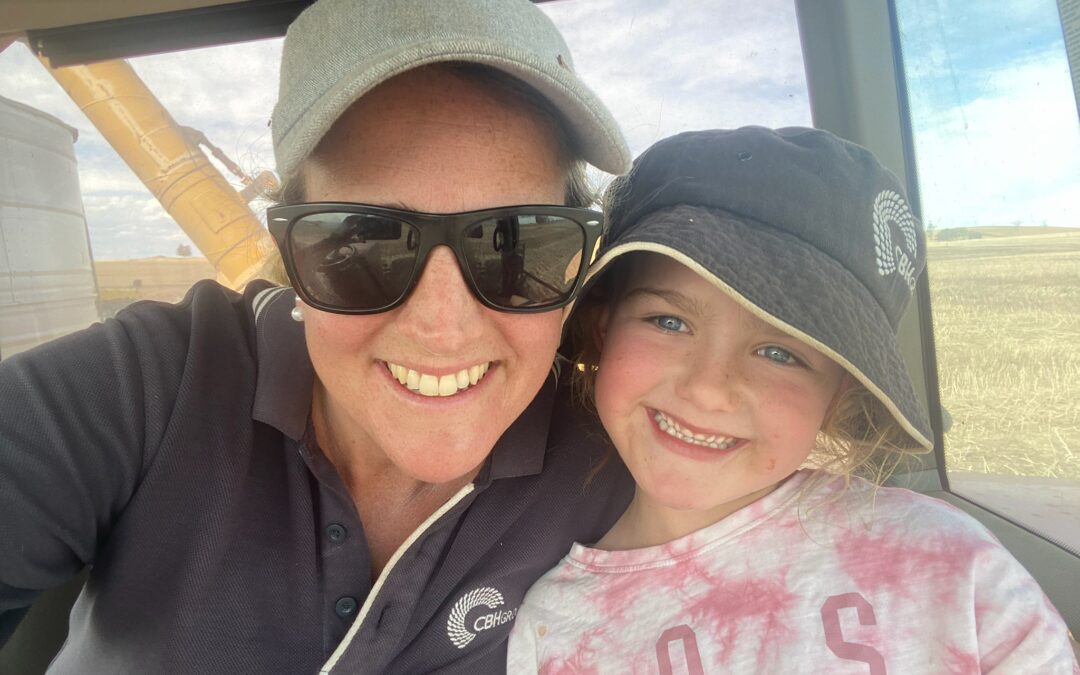Kelly is a passionate regional woman, having a long career in Agriculture after growing up on the family farm in Bindi-Bindi. She attended Muresk, completing an Agribusiness Marketing degree, before working with CBH for ten years. “I had some vast roles with CBH from grain marketing to grain quality, corporate affairs & logistics”.
After having her second child, Kelly left CBH to focus on working with her husband on their farm based in Beverly. Kelly stated that deciding to make a change and focus on her farm was hard initially. She had to let go of her career but admitted that her priorities had significantly changed. She wanted to focus on new challenges in the agricultural space. Instead of working for someone else, Kelly realised her skillset could be better utilised to help their farming enterprise. There were a variety of avenues to be followed and taken on, building upon prior successes. “I really thrive off working, I love it”.
Working on developing their farming practice, with the changing landscape of land prices in mind, they started to look at opportunities to utilise better the land they already owned. The topography of their land meant they had many gullies and areas not being used. They were fortunate enough to get government assistance, through their local Wheatbelt NRN (Natural Resource Management), as part of a national Landcare program. Their project of ‘Optimising fodder options’ saw the development of fencing off gully lines, planting lots of saltbushes, and feeding sheep. “We were able to identify lots of areas on our farm that weren’t being utilised.” This program kickstarted different ways of thinking about how other farmers are doing things, state-wide and on a national level, to provide flexibility.
Pastured Eggs was an area that Kelly started to take a lot of interest in because consumers during the start of the pandemic began to take more notice of where their food was coming from. Kelly stated, “Caged eggs would be phased out by 2036”. It also appealed to Kelly, now with three small daughters, as something they could do together that wasn’t dangerous or around large machinery. Before the business, Kelly admits that she had only ever had chickens on a small scale, this was the first time that she had vast quantities on her farm. “At our peak, we were doing 15,000 eggs a week”. Managing all of this during COVID when employment shortages were high meant Kelly had to recruit her mum, who had time to be on the farm and play a role in the business.
Managing all of this was no small feat, and Kelly, with her experience in business, realised that she needed to develop a plan which allowed her the freedom to work on her business instead of in it. It was about being able to outsource to keep the business ticking over. At the same time, Kelly understood what her customers’ needs and wants were, all whilst analysing the numbers to perform better each week. “If you’re a business owner, you need to learn when you are getting caught up in the day to day and focus on working on your business for growth”. There was nothing short of a few learning curves when Kelly started to scale the business—admitting that supply and demand were often up and down due to serval factors including weather extremities, new pullets and capacity to lay, and allowing for meeting customers’ expectations. “Production can significantly drop off due to weather, and good communication skills are key in our business to give our clients an understanding of why production is down or up”.
The pandemic gave Kelly a lot of time to think and reassess their farm and identify what they saw for their farming practice’s future, ultimately leading to decreasing their egg business and scaling their cropping and livestock. “With the labour shortage, as well as a few years until all our kids are in school full time, we reduced it (the egg business) to work in with the family”. During 2020 there was hardly any regional events, which left Kelly with more time to work on the eggs. Once 2021 came around, most community events back into total capacity, which saw her and her family involved a lot more in what was going on in the region, leaving even less time for the eggs. “I love juggling lots of balls in the air, and I thrive when I am multitasking and working with a lot of people, and I didn’t want to forgo that community involvement”.
Kelly encourages women to share their great ideas in their businesses, both in Agriculture and outside. “There are so many good things that women are doing within their business”. Noting the blokes gather around talking about the trials and the things they have done that has led to success in their farming business (more than they talk about their family). In 2019 Kelly and a couple of women in her local area saw a gap and formed an Ag group called Novas Agri. The group provides women and like-minded people in ag to gather to progress their place in the industry and improve farming practices. Passionate about education and promotion of Agriculture in schools, Kelly believes it is up to the producers to share their story directly to consumers and grow that awareness. “I would love to be a driving force to help develop this in any way that I can.” Kelly knows how many positives can come out of educating people on how farmers are contributing to the growth of the regions and focusing on the positive. “We need to be proactive, and as a group improve those stigmas via communicating our story”.


